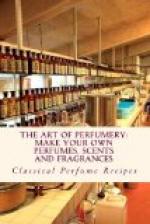[Illustration: Clove.]
The oil of cloves may be obtained by expression from the fresh flower-buds, but the usual method of procuring it is by distillation, which is carried on to a very great extent in this country. Few essential oils have a more extensive use in perfumery than that of cloves; it combines well with grease, soap, and spirit, and, as will be seen in the recipes for the various bouquets given hereafter, it forms a leading feature in some of the most popular handkerchief essences, Rondeletia, the Guard’s Bouquet, &c., and will be found where least expected. For essence of cloves, dissolve oil of cloves in the proportion of two ounces of oil to one gallon of spirit.
DILL.—Perfumers are now and then asked for “dill water;” it is, however, more a druggist’s article than a perfumer’s, as it is more used for its medicinal qualities than for its odor, which by the way, is rather pleasant than otherwise. Some ladies use a mixture of half dill water and half rose water, as a simple cosmetic, “to clear the complexion.”
The oil of dill is procured by submitting the crushed fruit of dill (Anethum graveolens) with water to distillation. The oil floats on the surface of the distillate, from which it is separated by the funnel in the usual manner; after the separation of the oil, the “water” is fit for sale. Oil of dill may be used with advantage, if in small proportions, and mixed with other oils, for perfuming soap.
EGLANTINE, or SWEET BRIAR, notwithstanding what the poet Robert Noyes says—
“In
fragrance yields,
Surpassing citron groves or
spicy fields,”
does not find a place in the perfumer’s “scent-room” except in name. This, like many other sweet-scented plants, does not repay the labor of collecting its odor. The fragrant part of this plant is destroyed more or less under every treatment that it is put to, and hence it is discarded. As, however, the article is in demand by the public, a species of fraud is practised upon them, by imitating it thus:—
IMITATION EGLANTINE, OR ESSENCE OF SWEET BRIAR.
Spirituous extract of French rose pomatum,
1 pint.
" " cassie,
1/4 "
" " fleur
d’orange, 1/4 "
Esprit de rose, 1/4
"
Oil of neroli, 1/2
drachm.
Oil of lemon grass (verbena oil), 1/2
"
ELDER (Sambucus nigra).—The only preparation of this plant for its odorous quality used by the perfumer, is elder-flower water. To prepare it, take nine pounds of elder-flowers, free from stalk, and introduce it to the still with four gallons of water; the first three gallons that come over is all that need be preserved for use; one ounce of rectified spirit should be added to each gallon of “water” distilled, and when bottled it is ready for sale. Other preparations of elder




